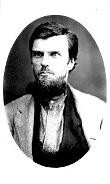Born: Established: ca. Jun 1845 Down (County),
AustLit
 8451729054037323551.jpg
8451729054037323551.jpg
From Moonlite's gaol papers, State Records, NSW
Captain Moonlite
Captain Moonlite
i(A150641 works by)
(a.k.a.
Captain Moonlite; Andrew George Scott)
Born: Established: ca. Jun 1845 Down (County),
Born: Established: ca. Jun 1845 Down (County),
c
Ireland,c
Western Europe,
Europe,
;
Died:
Ceased:
20 Jan 1880
Darlinghurst,
Kings Cross area,
Inner Sydney,
Sydney,
New South Wales,
Gender:
Male
Arrived in Australia:
ca.
1868
The material on this page is available to AustLit subscribers. If you are a subscriber or are from a subscribing organisation, please log in to gain full access. To explore options for subscribing to this unique teaching, research, and publishing resource for Australian culture and storytelling, please contact us or find out more.
BiographyHistory
Most Referenced Works
Notes
-
See also the full Australian Dictionary of Biography Online entry for Scott, Andrew George (1842-1880).
-
Note regarding birth date:
Andrew George Scott was baptised on 5 July 1842, and therefore likely born no later than late June 1842.
Last amended 16 Nov 2016 14:25:47

